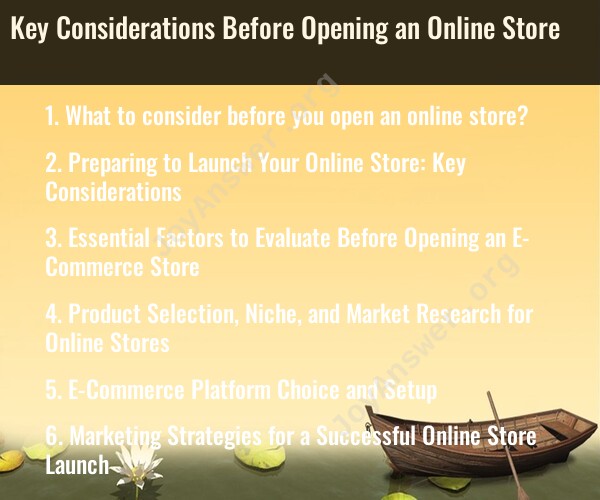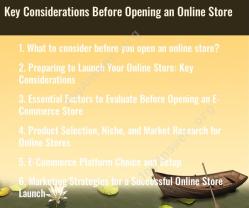What to consider before you open an online store?
Before opening an online store, there are several key considerations to keep in mind to ensure your e-commerce venture is successful. Here are some important factors to consider:
Market Research:
- Identify your target audience and niche. Who are your potential customers, and what products or services are they interested in?
- Research your competitors to understand their strengths and weaknesses, pricing strategies, and customer base.
Business Plan:
- Create a detailed business plan outlining your goals, budget, revenue projections, and marketing strategies.
- Determine your pricing strategy, budget for initial expenses, and establish a plan for future growth.
Legal and Regulatory Requirements:
- Register your business and ensure it complies with local, state, and federal regulations.
- Consider trademarks, patents, and copyrights for your brand and products, if applicable.
Domain and Website:
- Choose a domain name that is easy to remember, relevant to your business, and reflects your brand.
- Invest in a user-friendly, secure, and mobile-responsive e-commerce website. You can use platforms like Shopify, WooCommerce, or Magento.
Product Selection:
- Carefully choose the products you want to sell. Consider product quality, demand, availability, and potential profit margins.
- Determine your sourcing or manufacturing strategy.
Inventory Management:
- Establish efficient inventory management processes to track stock levels, reorder products, and prevent overstock or understock issues.
- Consider dropshipping or print-on-demand models to minimize upfront inventory costs.
Payment and Shipping Options:
- Set up secure and convenient payment gateways to accept a variety of payment methods.
- Define your shipping strategy, including shipping carriers, rates, and policies.
Website Security:
- Prioritize the security of your online store to protect customer data and maintain trust. Use SSL certificates and secure hosting.
User Experience (UX):
- Ensure an intuitive and pleasant user experience on your website. Optimize navigation, page load times, and mobile-friendliness.
- Implement responsive design and clear calls to action.
Customer Support:
- Plan how you'll handle customer inquiries, returns, and support. Provide clear contact information and response times.
- Consider live chat, email, and phone support, as well as a comprehensive FAQ section.
Marketing Strategy:
- Develop a marketing plan that includes SEO, content marketing, social media, email marketing, and paid advertising.
- Create a brand presence on social platforms and engage with your target audience.
Search Engine Optimization (SEO):
- Optimize your website for search engines to improve organic traffic. Use relevant keywords and meta tags, and create high-quality content.
Analytics and Data:
- Implement analytics tools like Google Analytics to monitor website performance, track sales, and understand customer behavior.
- Use data to make informed decisions and adjustments to your e-commerce strategy.
Customer Acquisition and Retention:
- Consider how you'll attract new customers and retain existing ones through loyalty programs, discounts, and email marketing.
Scaling and Growth:
- Plan for scalability and growth. Consider how you'll handle increased demand, expansion into new markets, and additional product lines.
Customer Reviews and Feedback:
- Encourage customer reviews and testimonials to build trust and credibility. Address negative feedback professionally and use it to improve.
Financial Management:
- Monitor your finances closely, including revenue, expenses, and profit margins. Keep accurate records and have a budget for marketing and expansion.
Returns and Refunds Policy:
- Establish clear and fair return and refund policies that protect both your business and customers.
Testing and Quality Assurance:
- Before launching, thoroughly test your website, checkout process, and any e-commerce features to ensure they work flawlessly.
Customer Data Protection:
- Comply with data protection laws and ensure that customer data is kept secure. Clearly communicate your privacy policy.
Opening an online store can be a rewarding endeavor, but success often requires careful planning and ongoing attention to these key considerations. It's essential to adapt and refine your strategy as you gain experience and feedback from customers.
Preparing to Launch Your Online Store: Key Considerations
Launching an online store can be a daunting task, but it doesn't have to be. By taking the time to prepare and plan, you can set yourself up for success. Here are some key considerations to keep in mind:
1. Product Selection, Niche, and Market Research
One of the most important decisions you'll make is what products you want to sell. It's important to choose products that you're passionate about and that have a viable market. You'll also need to decide whether you want to sell products in a specific niche or a variety of products.
Once you've chosen your products, you need to conduct market research to understand your target market and the competitive landscape. This information will help you to develop your marketing strategy and set realistic sales goals.
E-Commerce Platform Choice and Setup
There are a number of different e-commerce platforms available, so it's important to choose one that's right for your needs and budget. Some factors to consider include the platform's features, ease of use, and pricing.
Once you've chosen a platform, you'll need to set it up and customize it to your liking. This includes adding your products, configuring your shipping and payment options, and designing your storefront.
Marketing Strategies for a Successful Online Store Launch
Once your online store is up and running, you need to start marketing it to attract customers. There are a number of different marketing strategies you can use, such as search engine optimization (SEO), social media marketing, and paid advertising.
It's important to develop a marketing plan that fits your budget and target market. You should also track your results and adjust your strategy as needed.
Essential Factors to Evaluate Before Opening an E-Commerce Store
In addition to the above considerations, there are a few other essential factors you need to evaluate before opening your online store:
- Legal and financial requirements: You'll need to obtain the necessary business licenses and permits, and you'll need to have a financial plan in place.
- Customer service: You need to be prepared to provide excellent customer service to your customers. This includes responding to inquiries promptly and resolving any issues that may arise.
- Shipping and fulfillment: You need to decide how you will ship your products to customers. You may want to handle this yourself or outsource it to a third-party fulfillment company.
- Security: You need to take steps to secure your online store and protect your customers' data. This includes using a secure payment processor and implementing SSL encryption.
Launching an online store can be a lot of work, but it's also a very rewarding experience. By taking the time to prepare and plan, you can increase your chances of success.
Additional tips for launching a successful online store:
- Create a strong brand identity. Your brand identity should be reflected in everything from your website design to your social media presence.
- Offer competitive prices and shipping rates. Customers are more likely to purchase from your store if you offer competitive prices and shipping rates.
- Make it easy for customers to find what they're looking for. Your website should be well-organized and easy to navigate.
- Provide excellent customer service. Be responsive to customer inquiries and resolve any issues promptly.
- Promote your online store through social media, email marketing, and other channels.
- Track your results and adjust your strategy as needed. This will help you to improve your website and marketing campaigns over time.
By following these tips, you can increase your chances of launching a successful online store.












